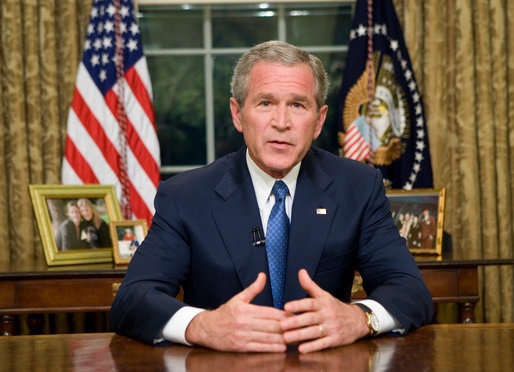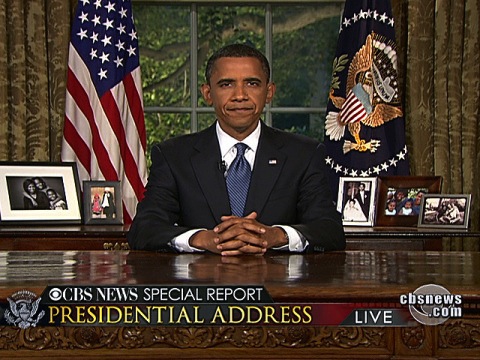![OvalOfficePresidentialAddress[screenshot]](http://voiceofbaltimore.org/wp-content/uploads/2013/09/OvalOfficePresidentialAddressscreenshot.png)
As defined by CBS News in 2010, ‘There is no greater symbol of the American presidency than the Oval Office. It’s used to address the nation about only the most momentous of events and most critical of issues.’
BACKLASH AGAINST FOREIGN POLICY
OF CHENEY, BUSH AND RUMSFELD
SPARKS NEW ANTIWAR MOVEMENT
Prime-time announcement on TV
that America will go to war
is relic of times past
KERRY NEGOTIATES SYRIA SOLUTION
By David Maril
In the good old days, if the President of the United States was about to order a significant military procedure, he would make a prime-time announcement on the major television networks.
The commander-in-chief, sitting in the White House Oval Office, would begin, “My fellow Americans,” and then explain, in confident, serious but reassuring terms, what was going to take place.
However in recent years, launching invasions and military strikes no longer seems to be considered a big deal.
Back in 2011, for example, the news gradually dripped out over the Internet and cable TV that the U.S. was, at least temporarily, taking the lead on creating a no-fly zone over Libya. However as Americans learned the news, casually getting brought up to speed, President Barack Obama was in the midst of a goodwill trip touring Brazil, Chile and El Salvador.
Apparently at that point in our history, dropping bombs on another country, whether one thought it was called for or unjustified, was no longer considered by our leaders to be a big deal. Instead of an address to the American people, we received a few vague, contradictory statements about how Muammar Gaddafi must go, but that he wasn’t the actual target of our attack.
We were reassured, indirectly through Obama spokespeople, that our troops were only going to be leading these bombing patrols for a few days, or the first week at most.
During this military commitment, the silence from the American public was deafening. There were very few questions from our citizenry over the rationale of engaging in multiple military conflicts at the same time on the other side of the world.
Now, fast-forward to today where military action has been running in slow-motion — no, make that stop-action.
Obama backed himself into a corner a while ago with his blustering comments about how he wouldn’t stand for the use of chemical weapons anywhere in the world. So when evidence kept surfacing that weapons of mass destruction had been used by Syrian President Bashar al-Assad against his own people, Obama was forced, reluctantly, to back up his threats and promises.
And then, just as everyone, including his closest advisors, thought he was going to order some type of “limited” military strike, he changed his mind and decided to seek approval from Congress.
The reason he was hesitant to pull the trigger? All of a sudden, after a decade of apathy, the American people are starting to question these ambitious military commitments.
With public sentiment heavily against even limited military engagements with a country in the midst of a horrible civil war, the President was on the verge of suffering an embarrassing defeat in the House of Representatives. Needless to say, when the opportunity surfaced to resolve this issue through international negotiations, the hardest thing Obama had to do was act as if he was reluctant to do it and skeptical, hiding how relieved he must have been feeling.
RISKY MILITARY ACTION HAS BEEN AVOIDED
Who knows whether this negotiation process will result in complete confiscation of all the chemical weapons in Syria? But at least, for the time being, risky military action has been avoided and an International negotiation process has been taking place.
And now, on Saturday, Secretary of State John Kerry and Russian Foreign Minister Sergey Lavrov, after days of intense negotiations in Geneva, have reached agreement on a framework to secure and destroy Syria’s chemical weapons by mid-2014 and impose U.N. penalties if the Assad government fails to comply.
The point being, whether we like Vladimir Putin or not, the U.S., Russia and China need to be talking to each other and trying to find peaceful ways to keep rogue governments like Syria — and Iran and North Korea as well — under control.
Obama does not personally like Putin, by the way. But so what? He, and we as a nation, need to deal with him.
THE SABER RATTLING OF WARMONGERS
And despite the saber rattling of warmongers like Senators Lindsey Graham and John McCain, the American people have had enough of lives and money wasted irresponsibly.
Fighting in conflicts that involve our national security is one thing. Irresponsibly committing to conflicts based on military distortions and false information, is quite another.
It’s ironic that the irresponsible and costly foreign affairs policies of George W. Bush, Donald Rumsfeld, and Dick Cheney have had such a backlash that the public has become increasingly skeptical of military engagements; and the antiwar movement — which had all but disappeared — has now returned.
Until the last few weeks, it looked as if the once-powerful peace movement had been eliminated in this country.
![Johnson,Lyndon-OvalOfficeTVspeech(Mar.31,1968)[screenshot]](http://voiceofbaltimore.org/wp-content/uploads/2013/09/JohnsonLyndon-OvalOfficeTVspeechMar.311968screenshot.png)
Lyndon Johnson always began his Oval Office messages to the nation with the introductory phrase, ‘My fellow Americans...’
During the late 1960s, a significant portion of our population began questioning foreign war policy. There were protests, peace demonstrations and marches on Washington as millions took issue with the policies of Presidents Lyndon Johnson and Richard Nixon.
In recent years, however, war has become much less a dividing line. Most in Congress supported the bombing of Libya. And some Republicans even criticized Obama for not starting the bombing sooner.
Democrats, as is often the case, began doing a lot of tap dancing around the premise that this was a mission to save lives and just a temporary engagement, while at the same time the general public seemed concerned with wanting to know as little as possible about international warfare — unless it affected what they had to pay to fill up the gasoline tanks of their cars and trucks.
One of the major reasons the peace movement lost its muscle and voice after Vietnam was the elimination of the military draft. In the 1960s and early seventies, with the draft, just about every American family was impacted by war.
All young men registered with the Selective Service upon turning 18. Right away this raised the possibility of putting one’s life on the line for causes that seemed far less clear than what we were fighting for in World War II.
MORE REPRESENTATIVE OF ALL SEGMENTS
In addition, while the draft was in existence, the armed forces were more representative of all segments of our society. When we were at war, the strain of having family members risking their lives on foreign soil impacted nearly everyone.
Sure, wealth and political influence allowed for some exceptions and favoritism. And there were exemption categories, such as student deferments. But on the whole, war affected almost every neighborhood, community and family.
Today, with a volunteer army and no draft, the people serving in the military know the risks before they join. They no longer sign up for the Navy or the Air Force out of fear of being drafted into the infantry. Widespread outrage and anguish, outside of the families who are directly impacted by war and death, has substantially diminished.
I’m not advocating another draft. By all accounts, the volunteers comprise an extremely professional military system. And if the numbers are there to provide the necessary depth, with people deciding on their own to serve, that’s fine.
DRAFT HAS MADE US MORE INDIFFERENT
But it is ironic that the abolition of the draft, which was viewed as a major step toward a more peaceful and progressive society, has actually made us more indifferent as a nation to war.
Thankfully, much of this apathy, and blind acceptance of whatever the double-talking politicians are feeding us, is starting to fade.
That’s a good sign. We need healthy and vigorous debates over all important issues. For too many years it looked as if the absence of a vocal antiwar movement had removed one of the safeguards against the President and Congress becomingly too reckless and hawkish.
davidmaril@hermanmaril.com
“Inside Pitch” is a weekly opinion column written for Voice of Baltimore by David Maril.

George W. Bush announced from the Oval Office that America would invade Iraq in order to stop Saddam Hussein from deploying ‘weapons of mass destruction.’ The WMDs — which U.S. forces never found — may have been moved to Syria.
EDITOR’S NOTE: In early 2003, immediately prior to the American invasion of Iraq by forces led by the United States and authorized by then-President George W. Bush, based on intelligence that Saddam Hussein possessed weapons of mass destruction — that were never found — Voice of Baltimore was informed by military contacts that convoys of trucks were observed on consecutive nights under cover of darkness crossing the border from Iraq into Syria. The belief expressed by those sources was that the trucks contained Iraqi stockpiles of WMDs. However this has never been acknowledged by official sources nor has it ever been mentioned since that time.
CHECK OUT LAST WEEK’S “INSIDE PITCH” COLUMN: click here
…and read previous Dave Maril columns by clicking here.







September 21st, 2013 - 5:21 PM
[…] been turning somersaults in his grave. CHECK OUT LAST WEEK’S “INSIDE PITCH” COLUMN: click here …and read previous Dave Maril columns by clicking here. Filed under: Top Stories […]